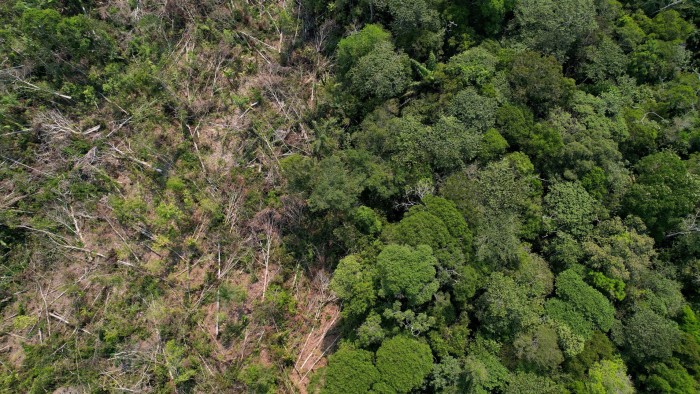This article is an on-site version of our Europe Express newsletter. Premium subscribers can sign up here to get the newsletter delivered every weekday and fortnightly on Saturday morning. Standard subscribers can upgrade to Premium here, or explore all FT newsletters
Good morning. European capitals are calling for a pause on all decisions that could irritate Donald Trump ahead of the Nato leaders’ summit in June, officials tell the Financial Times, arguing that keeping him happy in The Hague is critical for the continent amid deep uncertainty over what the long-term Nato sceptic will say or do there.
Today, our climate and trade correspondents report on one of those very issues: how EU deforestation laws affect American logging companies. And our finance and Kyiv correspondents preview today’s Ukraine parliament debate on the controversial minerals deal with the US.
Wood for the trees
Donald Trump is planning to announce a new trade pact with the UK today. Meanwhile, the EU has made little headway and an attempt to appease the US by delaying controversial import controls has fallen flat.
The US forestry industry has accused the EU of erecting trade barriers by favouring its own industry under amended deforestation rules, write Alice Hancock and Andy Bounds.
Context: The EU’s deforestation law, which will ban the import of products from sectors including rubber, cocoa, wood and paper if they come from deforested land, should have come into force last year. Under pressure from the bloc’s trading partners it was delayed until the end of the year.
Despite this respite, the nine biggest US forest product organisations in a letter accused the EU of setting “severe” compliance challenges, opening a new front in the growing transatlantic trade conflict.
The EU has categorised the US — and all its own members — as “low risk” according to a list shared with member states last week, meaning that there will be fewer checks on US products. But the American producers said that the bureaucratic hurdles were still too high.
Heidi Brock, head of the American Forest & Paper Association, said in a separate statement that the law amounted to a “non-trade tariff barrier” for US paper and wood products.
“The key compliance barrier, geolocation traceability, continues to represent unachievable technical hurdles given the nature of US pulp and paper supply chains,” Brock said.
American products were made from trimmings of timber collected from saw mills, making it impossible to trace where the original tree was cut down, she said.
The letter, sent yesterday, said that the latest updated guidance for businesses to comply with the rules “disproportionately benefit[s] EU supply chains, further widening the gap”.
Agriculture commissioners from 18 US states have lobbied the Trump administration, while the chairs of six congressional committees have asked the European Commission to largely exempt US companies altogether, according to letters seen by the FT.
Chart du jour: Unpredictable
Many women are disengaging ahead of Poland’s upcoming presidential election, feeling let down by the current government for failing to overturn the country’s near-total abortion ban.
Terms and conditions apply
The Ukrainian parliament is expected to approve a minerals deal with the US today, giving Washington access to Ukraine’s natural resources in return for a potential contribution to the war-torn country’s reconstruction, write Paola Tamma and Christopher Miller.
Context: The deal, signed in Washington last week, establishes a “reconstruction investment fund” for Kyiv. US President Donald Trump had insisted on it as repayment for billions of dollars in aid provided to Ukraine since Russia’s full-scale invasion began in February 2022.
The fund will invest in the extraction of critical minerals, oil and gas. The fund’s profits will be reinvested in Ukraine over the first decade, afterwards they will be split halfway between Kyiv and Washington.
Kyiv’s European allies worry the deal could undermine Ukraine’s obligations as a candidate EU member. “The compatibility with the accession process isn’t clear,” said one EU diplomat.
They pointed out that a clause on dispute resolution through “mutual consultation” is particularly worrying as it leaves Ukraine open to blackmail and horse-trading. “There is no third and impartial body but ‘my word against yours’,” they added.
President Volodymyr Zelenskyy and his office have been working behind the scenes in Kyiv to ensure the deal passes smoothly. While his ruling party holds a majority, its MPs don’t always vote together.
Oleksandr Merezhko, head of the parliament’s foreign affairs committee, said he expected it to pass comfortably, and even hoped it would receive a 300-vote constitutional majority to send a “strong signal” of approval.
What to watch today
European Commission president von der Leyen receives Irish Taoiseach Micheál Martin.
Informal meeting of EU foreign ministers in Warsaw continues.
Now read these
Student visa woes: The UK and the EU are deeply split over the terms of a youth mobility scheme that is a key part of a post-Brexit “reset” agreement.
Mittelstand moves: Germany’s small and medium-sized businesses are pivoting to defence amid European rearmament.
Financial deepfakes: Brussels faces pressure to fight online payments scams on social media platforms that cost people billions of euros each year.
Recommended newsletters for you
Free Lunch — Your guide to the global economic policy debate. Sign up here
The State of Britain — Peter Foster’s guide to the UK’s economy, trade and investment in a changing world. Sign up here
Are you enjoying Europe Express? Sign up here to have it delivered straight to your inbox every workday at 7am CET and on Saturdays at noon CET. Do tell us what you think, we love to hear from you: europe.express@ft.com. Keep up with the latest European stories @FT Europe



